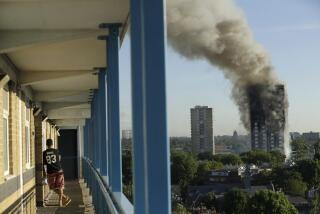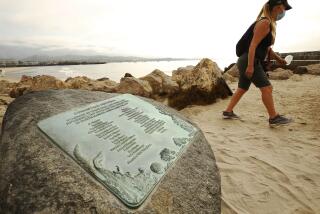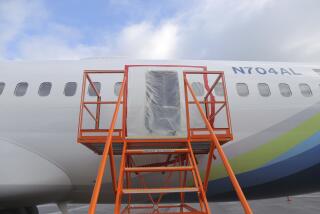Chief of ValuJet Probe Panel Vows Changes
MIAMI — Choking back tears, a federal safety official Friday told the families of ValuJet crash victims that “we can’t make the pain go away,” but he promised changes to ensure that “this kind of accident never happens again.”
John Goglia, head of the National Transportation Safety Board panel investigating the May 11 crash, made the comments at the end of weeklong hearings critical of the airline, maintenance contractor SabreTech and the Federal Aviation Administration.
Earlier in the day, an FAA manager testified that his call for an immediate review of ValuJet’s right to fly three months before Flight 592 plunged into the Everglades was ignored by his supervisor. All 110 people aboard died in the crash.
The failure to follow up on the report provoked more anger from the NTSB panel and victims’ families. So when the testimony concluded, Goglia addressed families directly from the podium, as he has done several times during the hearings.
“Personally I know what we couldn’t do,” he said. “We can’t make the pain go away. I wish we could, but that’s not possible.”
But he promised that his panel, which has been critical all week of the FAA, would make changes.
The families applauded Goglia, as they have several times.
After the hearings concluded, family members charged that government procedures may have led to the deaths of their loved ones.
Robert Schaumbach, who lost his sister, brother-in-law and their three children, said the fire aboard the ValuJet plane was “fed by incompetence, indifference and arrogance in the industry and federal bureaucracy.”
Improperly boxed oxygen canisters in the jet’s cargo hold are believed to have started the fire that caused the crash.
The anger grew Friday after the testimony of FAA middle manager John Tutora, who said his ValuJet report was ignored.
*
NTSB investigative panel member Bernard Loeb said he found it “mind-boggling that this could happen in a federal agency whose main mission is safety, or should be safety.”
ValuJet’s problems went beyond mere growth, Goglia said, noting that the airline had 15 emergency landings, including five engine failures, in 1994, when it had a fleet of 14. “What does it take to trigger a response? Who’s sleeping?” he asked.
“I don’t think anyone’s sleeping,” responded William White, deputy director of flight standards at the FAA. “I think they’re doing their job.”
The NTSB hearings expanded into a critique of the FAA’s handling of the nation’s public safety during a period of rapid growth of start-up airlines.
*
Tutora’s internal report before the crash criticized the airline and the FAA, while urging closer scrutiny of ValuJet. The FAA had already cited ValuJet for various deficiencies or violations in operations, safety and maintenance.
Tutora said he gave the report to his boss, Frederick Leonelli, then manager of the FAA’s aircraft maintenance division, on Feb. 14, but it apparently wasn’t shared with other supervisors or regional staff in Atlanta, where ValuJet is based.
Leonelli has since retired and has not been called to testify.
The FAA began four months of surveillance of ValuJet on Feb. 22 anyway, but Tutora’s report had nothing to do with the decision.
Tutora said he believed his report was ordered so that Leonelli could have a “snapshot” of the airline in case he was questioned about ValuJet during a congressional hearing on the FAA.
More to Read
Sign up for Essential California
The most important California stories and recommendations in your inbox every morning.
You may occasionally receive promotional content from the Los Angeles Times.










